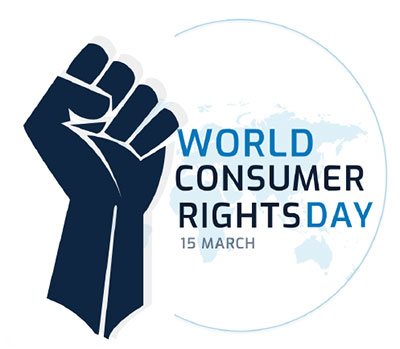ON March 15 every year, World Consumer Rights Day is celebrated worldwide. The main coordinator of these celebrations is Consumers International, which has a membership of over 100 countries. Each year a theme is chosen, of which members should take especial cognisance throughout the year. This year there is a global call to tackle and eliminate the scourge of plastic pollution. In light of this, Helena Leurent, the Director-General of Consumer International, remarked: “Plastic pollution is one of the most pressing issues facing our planet. Consumer awareness of the plastic crisis is growing around the world. Consumers have a crucial role to shape the marketplace and we must support them to mobilise businesses and governments to ensure that sustainable consumption of plastics is accessible to all…”
Before we return to this theme, we would like to remind consumers and the public at large of the importance of consumerism and consumer associations worldwide. With the advent of the Industrial Revolution, the class which produced and distributed goods and services gained enormous power over the public and was able to exploit them. By the beginning of the 20th century, exploitation of consumers had reached a breaking point and there emerged many articulate groups who called for an end to the free-market system and replacing it with one of the many forms of socialism. At this juncture, consumerism emerged with the demand that the public and consumers be treated fairly, honestly and with safety not merely by the business community, but by government as well. Consumerism was purely pragmatic and eschewed and kind of ideological underpinning.
Consumerism, therefore, averted ideological conflict, made society more stable and gave acceptability to the free-market and capitalist system and the democratic spirit.
Governments have seen the value of consumerism not merely for protecting the rights of citizens, but as a pillar of a strong and stable state. In Guyana, there are five institutions which are devoted to consumer protection — the Consumer Division of the Ministry of Business headed by Ms Cheryl Tinnis; the Competition and Consumer Commission which administers the Consumer Protection Act; the Public Utilities Commission (PUC), which takes complaints in respect of the public utilities; the Consumer Advisory Bureau and the Guyana Consumers Association. Except for the PUC, all consumer bodies address consumer complaints of every kind.
The theme of this year’s World Consumer Rights Day (WCRD) as mentioned above is tackling the scourge of plastic pollution and waste. Plastics, unlike paper and other substances, are not biodegradable and could survive for centuries. They could not be burnt, since they would pollute the atmosphere and wherever they are disposed of, they accumulate. In the course of time, they find themselves everywhere as, for example, in the drainage system and the oceans. In the drainage system, they block the waterways and cause floods and swamps breeding mosquitos and other disease-carrying insects. Birds often mistake plastic pieces for food and eventually die after eating them. Wildlife of the oceans such as fishes, tortoises and even whales have their digestive systems destroyed after eating plastics. Plastic waste has been responsible for the deaths of large numbers of wildlife each year and for polluting the environment.
Plastics are very useful and in many cases have become a necessary adjunct to modern life. For example, disposable plastic bags and coverings are indispensable in commercial life or plastic plates, crockery and cutlery are necessary for fast-food or even restaurant industries. The best that could be done is to curtail the use of plastics and this could be done in a variety of ways. Such would include the banning of single-use plastic bags or having a recycling plant. Or repairing or reusing plastic items.
Or to buy unpacked goods as, for example, household or cosmetic products. Or substituting other items with similar usage for plastics as using paper or cloth bags when shopping or choosing metal household equipment rather than plastic ones as buying a metal clock than a plastic one. Government, the consumer community and the public have to steer the business community into using and adopting substitutes for plastic.
In working to effectuate the theme of WCRD, the seven Rs would be useful and these are: Reuse, Rethink, Refuse, Reduce, Recycle, Repair and Replace.




.png)









